Soviet America
It's Faker than you Think
"When we got into office, the thing that surprised me most
was to find that things were just as bad as we’d been saying they were."
—John F. Kennedy
Christian Heiens, June 2nd, 2025:
“The Left are arsonists who say “I want to burn your house down.”
The Conservative is the homeowner who obviously doesn’t want his house set on fire. But evicting the Leftist and establishing a gated community is “tyranny,” so the two instead do the liberal democratic thing of engaging in honest debate, respectfully hash things out over the course of a few elections, and after some court challenges eventually settle on only burning down the living room.
Rinse and repeat over the course of 80 years and there’s nothing left standing of the house.”
—Christian Heiens, June 2nd, 2025
For almost fifty years, the American empire has been eating itself. People are in denial about how bad it’s been. A permissive attitude towards crime, paired with an imperial economic policy that favored foreign nations at the expense of American citizens, has resulted in social erosion. It’s difficult to escape. When you drive around American highways, many regions look bombed out, as if they had lost a war. When you enter a local Walmart, the grocery store aisles swarm with foreigners, as if our nation had suffered a military invasion.
Citizens attempt to earn enough money to run away from imperial decline. The amount of money needed to afford a 1950s quality of life has gone from difficult… to heroic… to impossible for the median family.
Over the next few years, as American decline reverses, people are going to be shocked how much their lives will improve without the weight of a negligent, malicious government constantly suffocating them. And for the first time, they’re going to realize how bad the status quo has been — for decades.
The dominant attitude in America has long been a sense of denial.
People don’t want to acknowledge their situation: trapped in a decaying ecosystem, troubled by incessant waves of overlapping crises, all of which has been too big for any individual person to mitigate, or solve — no matter how brave, smart, selfless, talented, persistent, or heroic.
Denial is a curious part of the human psyche. It’s supposed to be an abnormal psychological reaction that surfaces during emergencies, but it’s become normal amid the chronic stress and dissociated anxiety of the industrial Western world. At all times, citizens are besieged by opaque bureaucratic tyranny, deluged by sporadic moral panics, intimidated into submission by a dishonest civic religion.
Denial is one of the defining traits of the Boomer generation, who are rich with assets but are confused how to apply their economic ownership towards reforming America, and therefore retreat into sedation and collective passivity.
Some thoughts about denial…
Denial is a psychological defense mechanism. It stalls for time, hoping that the environment might improve.
People lie to themselves when the truth gives them no leverage.
A problem with no solution doesn’t stay a problem — it vanishes. Not because it’s gone, but because people stop looking.
Broken, corrupt systems like modern America are able to persist and sustain themselves because no one wants to admit the existence of a crisis. It’s frightening to identify the elephant in the room if nobody can imagine how to fix it. To admit a problem is to accept responsibility. But if no solution exists, responsibility becomes unbearable. The psyche recoils. It buries the truth in darkness. Human beings are wired for meaning, not chaos.
The Covid lockdowns offered the negative significance of trying to survive a deadly pandemic, and the shared community experience of enduring a collective mental breakdown. In retrospect, Covid itself was a mild sickness on par with seasonal flu. The danger was a social illusion, a corporate scam, and a government power grab. But five years later, a handful of people are still wearing masks in public. They’re not motivated by fear of getting sick. They’re motivated by a desire for significance. Wearing a mask gives them purpose; it makes them feel important. This speaks to the emptiness of modern America.
Life in America offers suffering without meaning; struggle without community; competition without camaraderie.
What’s pathetic, yet true, is that wearing a mask and the cowardly act of hiding from a gentle illness was the first time that many Americans felt any kind of adventure or fulfillment in their lives. That’s why they continue to cling to the unnecessary ritual of medical protective gear, reliving their fear.
In a time of spiritual emptiness, even self-destruction can be tempting.
Adults can confront terrible grief. But only if they believe their actions matter. Hope is what makes honesty possible. Hope, in this way, precedes truth. It creates the psychic space in which honesty can live. Denial is not the absence of awareness, but the postponement of it until the self is ready.
Man is not destroyed by suffering alone. He is destroyed by suffering without meaning.
To face pain without purpose is to face despair.
A survivor will grapple tenaciously with illness, loss, injustice, even death — if their struggle holds meaning. Without purpose, constant pain becomes overwhelming and intolerable.
Human minds desire narrative continuity. They cannot tolerate an open wound with no suture. If confronted by an impossible problem — if desperate searching fails to identify an available solution — the subconscious ego protects itself through negation. It says: this is not happening. Not because the facts are unclear, but because the implications are intolerable.
The human psyche craves spiritual direction. The soul needs to believe there is something redemptive on the other side of suffering. Without that belief, hideous truths become agonizing and unbearable. So they’re buried. And suppressed. And denied.
When a solution emerges — however small — the burden becomes bearable. The fog lifts. The problem becomes a dragon that can be slain, rather than a formless terror.
Human nature denies a crisis, until a savior arrives, or a solution appears to dissipate the danger.
Denial, more than anything, is what makes modern American life feel Soviet. It’s the managed decline of passively watching a flash mob of urban scholars plunder a shopping mall in front of a crowd of dazed, motionless bystanders who know that thefts of $900 or less have been decriminalized.
Nightmare Vision, “Plans, Trans, and Autogynephiliacs”:
“America is a country with a deeply dishonest and insincere public discourse. Our official commitment to liberalism means that power and the ability to manipulate others’ behavior and choices is concealed behind a thick layer of incoherent verbal pieties that serve as a comforting coping mechanism for true believers. The darker view is that they form a convenient smokescreen for those interested in the very human desires to dominate others and advance your own status at the expense of your enemies.
Think of liberalism as the mounds of earth that sit between the archaeologist and the fossils he wants to study. In the same way, the relationships of power between people don’t really change much, but to see how they truly function in a country like ours requires an effort of clearing away mountains of verbiage specifically dedicated to convincing observers and citizens that the normal relationships of power have been suspended in our case, as we are exceptional.
…
No matter what Americans say outwardly about freedom or liberty, the reality is that we are constantly being subjected to radically revolutionary change. This change is implemented through a series of informal and indirect pressures that eventually culminate in a new and unprecedented understanding of our own political and civil ideals.
From at least the Sixties onward, American citizens have had to conduct their political life under a severe psychological angst. This specific angst is the result of a process whereby identities portrayed as deprived of the privileges of liberalism are systematically weaponized against the majority population. This has been our normal politics for some time. Whether it’s being performed through litigation, activism, digital mobs, protests, foundations, journalists and news media, academics, or corporate pressure (woke capital), our levers of power are consistently being manipulated in favor of the periphery over the center. The center, historically white and Christian, can only be understood as responding under duress, meaning responding to political and cultural shifts while suffering from a severe collective anxiety that cripples effective response.
This is partly what people mean when they describe Baby Boomer politics; everything done under implicit threat. This process has used racial and religious minorities, immigrants, women, homosexuals and, now transsexuals, but this is only the material content of a formal procedure that hasn’t essentially changed.
…
If you’ve noticed, this is just the civil rights movement as playbook, as a template of society wide transformation. This puts a new spin on the cliché of racism being America’s original sin. It isn’t original sin but original success, the format whereby all other contemporary political revolutions will attempt to effectively alter norms, laws, and perceptions. Angry and hormonal GameStop pre-op transexuals admiringly gazing upon a picture of Rosa Parks, saying to themselves “Wow, she’s just like me (female).”
You may have also noticed that the marginalized groups in question don’t ever receive a true and thorough amelioration of their circumstances. Unfortunately, the FBI still keeps crime statistics, the CDC still keeps statistics on LGBT health, disease, and life expectancy, and feminists, to their eternal ire, can still get pregnant. At the same time, corporate power is building an almost parallel government within US jurisdiction that enjoys the sincere support of people who have convinced themselves that these companies will be able to do the dirty work of revolution better than the state.
It should be clear how deeply immoral this entire scheme is. Both practically and theoretically, no people should be forced to conduct themselves in what is appropriately described as a perpetual hostage situation, where dangerous or seriously ill people serve as battering rams for state and corporate power against citizens who are too socially disconnected and morally impotent to oppose it. Our neighborhoods, our schools, our workplaces, our politics, and even our very language are totally out of our own control. We must continually bend to the whims of increasingly grotesque identities that almost dare us to speak out in either laughter or horror. Yet we remain silent. We know what awaits us if we don’t.”
—Nightmare Vision, “Plans, Trans, and Autogynephiliacs”
Plans, Trans, and Autogynephiliacs – The American Sun
One of the defining features of modern America is the gulf between the written legal code that our government claims to uphold, and the selective enforcement of arbitrary, invasive laws that are used to crush political opponents.
“By 1997 Apple had lost the case and various appeals, but remnants of the litigation and threats of new suits lingered. In addition, President Clinton’s Justice Department was preparing a massive antitrust case against Microsoft. Jobs invited the lead prosecutor, Joel Klein, to Palo Alto. Don’t worry about extracting a huge remedy against Microsoft, Jobs told him over coffee. Instead simply keep them tied up in litigation. That would allow Apple the opportunity, Jobs explained, to “make an end run” around Microsoft and start offering competing products.”
—Walter Isaacson, “Steve Jobs” (biography)
Personal denial is downstream of institutional dishonesty. Citizens are prisoners, held hostage to a code of linguistic shibboleths, professional certifications, and religious taboos. But rather than confront their own powerlessness, American citizens prefer to believe they live in the Land of the Free, the Home of the Brave.
Americans were a wild, ferocious frontier people — generations ago.
Today’s Americans are anxious, domesticated consumers who are unwilling and incapable of fighting for their own interests.
Today’s America resembles the late stages of the Soviet Union, when Russian society no longer believed in itself.
Benjamin Braddock, Cold Immigration:
“In a scene from Adam Curtis’ docuseries Russia 1985-1999: TraumaZone, an interviewer asks a young woman: “If you had a wish, what would it be?” The young woman answers, “I don’t have any dreams, and even if I did they wouldn’t come true. I don’t believe in anything or anyone.” This sense of depressive nihilism permeated throughout Soviet society until it had completely eroded its cultural, political, and economic institutions. Yet the collapse of the Soviet system caught Western leaders by surprise. The biggest mistake the West made at the end of the Cold War was believing it had won. In reality, the Soviet Union crumbled from within. The intelligence agencies had no idea how weak the Soviet Union had become until its satellite states began falling like stars. Still, the West patted itself on the back for its brilliant victory.”
—Benjamin Braddock, Cold Immigration
https://im1776.com/immigration/
Benjamin Braddock, The Architects of Our Present Disaster:
“Russia in the 1990s was a wreck. In the wake of the fall of the Soviet Union, Russia’s government became a puppet state of America and the West and its economy was a monumental disaster. People stopped getting paid, monthly inflation was in the double-digits, life savings disappeared overnight, banks disappeared overnight. The fertility rate plummeted, along with life expectancy, with over five million excess deaths recorded over the decade — mostly from deaths of despair. During post-Soviet privatization, large state enterprises were sold for pennies on the ruble to the politically well-connected, which is how most of the oligarchs acquired their fortunes. And politically well-connected Americans made fortunes in Russia as well.
Wayne Merry, a U.S. official at the embassy in Moscow in the 1990s said later: “We created a virtual open shop for thievery at a national level and for capital flight in terms of hundreds of billions of dollars, and the raping of natural resources and industries on a scale which I doubt has ever taken place in human history.” It was against this backdrop that Putin rose to power. Funny enough, when Boris Yeltsin picked Putin as his presidential successor, he called Bill Clinton to get approval. Putin came to power with one burning desire: to Make Russia Great Again, and to keep it from ever being humiliated the way it was in its lost decade.”
—Benjamin Braddock, The Architects of Our Present Disaster
https://amgreatness.com/2022/03/14/the-architects-of-our-present-disaster/
Dishonesty is something that rots a country
Dishonesty contaminates everything. Fraud has a tendency to accumulate. Distortions pile upon distortions. Statistics are bent, measurements are nudged, reports are finessed, and soon everyone is lying to each other, so much evasion and trickery and misdirection that eventually even the foremost experts of a subject risk drowning in a curated cesspool of flattery and wishful thinking.
When you demand dishonesty and unconditional compliance as part of the selection filters to gatekeep rising young talent, it has the long-term consequence of purging anyone with courage or integrity. The worst elements of society emerge to rule. After a couple generations, civilization is directed by a cadre of immoral and contemptible leaders.
The core sin of the American civil religion has been racism, with Adolf Hitler presented as the devil who gives negative significance to the Global American Empire, with the Holocaust acting as one of the foundation-myth events that shaped the monoculture worldview.
America is deeply dishonest about the Civil Rights Regime, a religious crusade that desires to domesticate mankind and conquer the world in pursuit of a Quixotic dream of egalitarianism.
Today’s Soviet America is a feminine tyranny which prefers indirect methods of socialization, propaganda, financial pressures, and ostracism. Russia’s Soviet Union was a brutal, masculine tyranny that tortured, starved, imprisoned, and liquidated anyone who seemed inconvenient. One government mastered the implications and architecture of soft power; the other relied upon hard power. Raw, brute force.
But they’re ideological, political cousins.
Today’s Soviet America has been objectively worse than many sci-fi dystopian movies. Because cinema needs to entertain an audience — narratives require dramatic suspense, wish fulfillment, and a charismatic hero. Real life, in contrast, has no such requirement to elevate heroism above the sordid slums of the favela. Many aspects of modern American life resemble the opaque bureaucracy of a Kafka novel, but in this absurdist and hyperreal version of America, the tangled maze of circuitous, redundant, and arbitrary paperwork is a ritual humiliation staffed by obese black women who mock their own customers.
To gain perspective on how fake everything is, it’s useful to remember the bleak truths revealed by the Soviet Union’s collapse. So many deceptions. Because when America finally collapses, or when Trump fixes America and reverses the past five decades of imperial decline, a deluge of similar truths will flood the public discourse. A better future, if realized, will shed light on the completely unnecessary dysfunctions that have been embedded into America’s core institutions. The contrast between future excellence and past dysfunction will be amazing. A culture of chronic denial will evaporate, replaced by horrified astonishment that Americans allowed themselves to be ruled so badly for so long, accompanied by a slow-dawning relief that at last the nightmare is over.
The Soviet Union was a simulation. A mirage. The entire country was a Potemkin village.
The Soviet Union was a story told at gunpoint.
It looked good on paper. That was the whole point.
It was a house of cards built on forged ledgers, and every day it threatened to collapse.
From the Arctic shipyards to the black lungs of the Donbas mines, from the icy heights of the Kremlin to the dusty villages of Kazakhstan, the carceral nation pulsed with a kind of engineered unreality. The nation was erected upon a bedrock of lies; a labyrinth structure sustained by systematic obfuscation. A state built not on industry, but on the illusion of industry. Its five-year plans were designed more for ideological spectacle than production.
Every function of the state had been corrupted by fear and performance. It was all signal, no substance. There was no oxygen for dissent.
Managers lied to regional bosses, who lied to ministers, who lied to the Politburo, who lied to the world. And the lie was beautiful. An orderly, efficient utopia humming like an angry insect hive beneath the frostbitten skin of the twentieth century.
Officials engaged in a grand masquerade, a collective act of self-deception, sustained by a political system that demanded conformity over truth. Grain yields, industrial output, and economic growth were meticulously fabricated, transformed into a language of success that concealed the stagnation, scarcity, and suffering beneath.
It was a tale told in numbers, charts, and statistics, each carefully crafted to project an image of relentless progress and prosperity.
GDP line go up!
Wheat yields reported in overflowing bounty while fields lay bare. Steel production soared on paper, while factory floors stood cold, silent, and lifeless as tombs. Truth became dangerous. It was hidden in cellars, whispered behind kitchen doors, drowned out by the chorus of Party slogans and parroted progress.
Statistics were gospel, and honesty was a death sentence.
Utopias demand purity, and purity, in the hands of men, becomes a butcher’s art.
The nation was built on corpses and paperwork. Dissident truths were buried deeper than the Siberian permafrost.
Under Stalin, truth became contraband. The nation was force-fed graphs and maps like sacraments. If the reality contradicted the report, reality disappeared — along with anyone foolish enough to notice. Entire villages vanished.
Meanwhile, people starved.
Eventually the Soviet Union entered a stage of exhaustion. Widespread apathy. Endemic disillusionment. Tens of millions of people had been liquidated, but the promised future of Bolshevik paradise had never arrived. Russians were tired of sending their friends and neighbors to the gulags. The grand Soviet ideals of forging a new kind of humanity and uplifting the world were replaced by smaller, more petty desires for bread, shelter, employment, and survival.
Fatigue set in.
There was an ideological vacuum. Nobody wanted to keep repeating the same mistakes. But their crimes had piled up to such an extent, it was unclear how the bureaucrats of the Politburo could change directions without being murdered in another internal Party coup, or ripped apart by an angry mob of civilians who had survived the gulags.
They wanted to pivot, without admitting culpability, and therefore inviting a new wave of vengeful retaliations.
Enter Nikita Khrushchev, the son of a coal miner with a gift for bluster; round and red-faced; part clown, part confessor; half reformer, half relic; a brute defined by appetites and anxieties; a man born of soil and sweat; an old-world hardliner with a peasant’s boots and a revolutionary’s dreams. In 1956, he cracked the ossified silence of Stalin’s terror with his “Secret Speech,” mapping out a new vision for the Soviet Union. He denounced Stalin’s brutality and the plenary leadership of a single dictator. Instead of Stalin, he promised to return Russia to the vision and ideals laid out by Lenin, wherein collective leadership (an oxymoron and an impossibility) would once again be implemented by the Party.
In the same way that Deng Xiaoping denounced the brutality of Mao Zedong by pretending to return China to an earlier, and more pure version of Communist philosophy, Russian leadership attempted to transition away from the violence of Stalin without admitting they were making a transition.
One important truth was glossed over, which is the logic of a holiness spiral. During the early years of the Soviet Union, the Bolsheviks had ignited a holiness spiral which transformed into frantic, genocidal butchery. Russian-on-Russian carnage spilled into the streets, savage and nonstop. Stalin participated in the madness. But Stalin also ended the years of frenzied madness, by murdering anyone who might want to keep it going — anyone who might attempt to virtue signal that they were a more holy Communist priest than Stalin himself.
The murders that Stalin committed to consolidate power (purging his rivals, dissidents, irritants, and potential challengers) should not be confused with the murders Stalin committed to stabilize the entropic, accelerating self-cannibalization of the Soviet Union.
By the time Stalin finished, the fun of sending victims to the gulags had burnt out. Even hatred was spent. Everyone was too exhausted to continue another round of murdering their neighbors.
By denouncing Stalin, Khrushchev performed a political, ideological sleight of hand. The subtext of his speech was an era of deescalation, and an end to the constant killing of Soviet political figures. For obvious reasons, Khrushchev’s audience of prominent Soviet bureaucrats were happy to cheer the end of internal purges.
In the 1956 “Secret Speech,” Khrushchev revealed Stalin’s shadow architecture — the purges, the prisons, the atmosphere of paranoia. But Khrushchev’s new era of leadership didn’t kill the lie. He merely changed its flavor. Instead of fear, he peddled a kind of delusionary optimism. Terror was replaced by techno-utopianism. Corn would conquer Siberia. The Soviet economy would outstrip America’s. Rockets would pave a better utopia among the stars. It was a moral reckoning — but not a theological reformation. Khrushchev tried to patch the cracks of a dying empire with cornfields and cosmonauts, believing a brighter lie might be better than a darker one.
The lie evolved, becoming optimistic and absurd. A space-age fever dream.
Note: It’s notable that in the picture below, there are twenty men, and not one of them is handsome. Marxism is a biological phenomenon, produced by spiritual inferiority and sexual resentment. These men are fat, old, physically disgusting thugs who resemble pigs… no wonder George Orwell chose pigs to represent the Communists of his novel Animal Farm.
Nikita Khrushchev, On the Cult of Personality and Its Consequences
(Secret Speech Delivered by First Party Secretary at the Twentieth Party Congress of the Communist Party of the Soviet Union, February 25, 1956):
“The great modesty of the genius of the revolution, Vladimir Ilyich Lenin, is known. Lenin had always stressed the role of the people as the creator of history, the directing and organizational role of the party as a living and creative organism, and also the role of the central committee.
…
Lenin detected in Stalin in time those negative characteristics which resulted later in grave consequences. Fearing the future fate of the party and of the Soviet nation, V.I. Lenin made a completely correct characterization of Stalin, pointing out that it was necessary to consider the question of transferring Stalin from the position of Secretary General…
…
As later events have proven, Lenin's anxiety was justified; in the first period after Lenin's death Stalin still paid attention to his (i.e., Lenin's) advice, but, later he began to disregard the serious admonitions of Vladimir Ilyich…
…
Stalin acted not through persuasion, explanation, and patient cooperation with people, but by imposing his concepts and demanding absolute submission to his opinion. Whoever opposed this concept or tried to prove his viewpoint, and the correctness of his position was doomed to removal from the leading collective and to subsequent moral and physical annihilation. This was especially true during the period following the 17th party congress, when many prominent party leaders and rank-and-file party workers, honest and dedicated to the cause of communism, fell victim to Stalin's despotism...
Stalin originated the concept enemy of the people. This term automatically rendered it unnecessary that the ideological errors of a man or men engaged in a controversy be proven; this term made possible the usage of the most cruel repression, violating all norms of revolutionary legality, against anyone who in any way disagreed with Stalin, against those who were only suspected of hostile intent, against those who had bad reputations. This concept, enemy of the people, actually eliminated the possibility of any kind of ideological fight or the making of one's views known on this or that issue, even those of a practical character…
Lenin used severe methods only in the most necessary cases, when the exploiting classes were still in existence and were vigorously opposing the revolution, when the struggle for survival was decidedly assuming the sharpest forms, even including a civil war.
Stalin, on the other hand, used extreme methods and mass repressions at a time when the revolution was already victorious, when the Soviet state was strengthened, when the exploiting classes were already liquidated, and Socialist relations were rooted solidly in all phases of national economy, when our party was politically consolidated and had strengthened itself both numerically and ideologically. It is clear that here Stalin showed in a whole series of cases his intolerance, his brutality, and his abuse of power. Instead of proving his political correctness and mobilizing the masses, he often chose the path of repression and physical annihilation, not only against actual enemies, but also against individuals who had not committed any crimes against the party and the Soviet Government. Here we see no wisdom but only a demonstration of the brutal force which had once so alarmed V.I Lenin...
…
In practice Stalin ignored the norms of party life and trampled on the Leninist principle of collective party leadership.
…
It was determined that of the 139 members and candidates of the party's Central Committee who were elected at the 17th congress, 98 persons, that is, 70 percent, were arrested and shot (mostly in 1937-38).
…
The same fate met not only the central committee members but also the majority of the delegates to the 17th party congress. Of 1,966 delegates with either voting or advisory rights, 1,108 persons were arrested on charges of anti-revolutionary crimes, i.e., decidedly more than a majority. This very fact shows how absurd, wild, and contrary to commonsense were the charges of counter-revolutionary crimes made out, as we now see, against a majority of participants at the 17th party congress.
What is the reason that mass repressions against activists increased more and more after the 17th party congress? It was because at that time Stalin had so elevated himself above the party and above the nation that he ceased to consider either the central committee or the party. While he still reckoned with the opinion of the collective before the 17th congress, after the complete political liquidation of the Trotskyites, Zinovievites and Bukharinites, when as a result of that fight and Socialist victories the party achieved unity, Stalin ceased to an ever greater degree to consider the members of the party's central committee and even the members of the Political Bureau. Stalin thought that now he could decide all things alone and all he needed were statisticians; he treated all others in such a way that they could only listen to and praise him.
…
This directive became the basis for mass acts of abuse against Socialist legality. During many of the fabricated court cases the accused were charged with "the preparation" of terroristic acts; this deprived them of any, possibility that their cases might be reexamined, even when they stated before the court that their confessions were secured by force…
The mass repressions at this time were made under the slogan of a fight against the Trotskyites. Did the Trotskyites at this time actually constitute such a danger to our party and to the Soviet state?
…
During the 10 years which passed between the 15th party congress and the February-March central committee plenum, Trotskyism was completely disarmed; many former Trotskyites had changed their former views and worked in the various sectors building socialism. It is clear that in the situation of Socialist victory there was no basis for mass terror in the country ...
The majority of the Central Committee members and candidates elected at the 17th congress and arrested in 1937-38 were expelled from the party illegally through the brutal abuse of the party statute…
Eikhe was forced under torture to sign ahead of time a protocol of his confession prepared by the investigative judges…
On October 1, 1939, Eikhe sent his declaration to Stalin in which he categorically denied his guilt and asked for an examination of his case. In the declaration he wrote:
“There is no more bitter misery than to sit in the jail of a government for which I have always fought… I will die believing in the truth of party policy as I have believed in it during my whole life.”
…
On February 4 Eikhe was shot. It has been definitely established now that Eikhe's case was fabricated; he has been posthumously rehabilitated…
During the examination in 1955 of the Kornarov case Rozenblum revealed the following fact: when Rozenblum was arrested in 1937 he was subjected to terrible torture during which he was ordered to confess false information concerning himself and other persons. He was then brought to the office of Zakovsky, who offered him freedom on condition that he make before the court a false confession fabricated in 1937 by the NKVD…
When we look at many of our novels, films, and historical scientific studies, the role of Stalin in the patriotic war appears to be entirely improbable. Stalin had foreseen everything… Using such tactics, the Soviet Army, supposedly, thanks only to Stalin's genius, turned to the offensive and subdued the enemy. The epic victory gained through the armed might of the land of the Soviets, through our heroic people, is ascribed in this type of novel, film, and scientific study as being completely due to the strategic genius of Stalin.
…
During the war and after the war, Stalin put forward the thesis that the tragedy which our nation experienced in the first part of the war was the result of the unexpected attack of the Germans against the Soviet Union. But, comrades, this is completely untrue. As soon as Hitler came to power in Germany he assigned to himself the task of liquidating communism. The Fascists were saying this openly; they did not hide their plans. In order to attain this aggressive end, all sorts of pacts and blocs were created, such as the famous Berlin-Rome-Tokyo Axis. Many facts from the prewar period clearly showed that Hitler was going all out to begin a war against the Soviet state and that he had concentrated large armed units, together with armored units, near the Soviet borders...
Despite these particularly grave warnings, the necessary steps were not taken to prepare the country properly for defense and to prevent it from being caught unaware.
Did we have time and the capabilities for such preparations? Yes; we had the time and capabilities. Our industry was already so developed that it was capable of supplying fully the Soviet Army with everything that it needed...
Had our industry been mobilized properly and in time to supply the army with the necessary materiel, our wartime losses would have been decidedly smaller. Such mobilization had not been, however, started in time. And already in the first days of the war it became evident that our Army was badly armed, that we did not have enough artillery, tanks, and planes to throw the enemy back...
Very grievous consequences, especially in reference to the beginning of the war, followed Stalin's annihilation of many military commanders and political workers during 1937-41 because of his suspiciousness and through slanderous accusations. During these years repressions were instituted against certain parts of military cadres beginning literally at the company and battalion commander level and extending to the higher military centers; during this time the cadre of leaders who had gained military experience in Spain and In the Far East was almost completely liquidated…
…
We must state that after the war the situation became even more complicated. Stalin became even more capricious, irritable, and brutal; in particular his suspicion grew. His persecution mania reached unbelievable dimensions. Many workers were becoming enemies before his very eyes. After the war Stalin separated himself from the collective even more. Everything was decided by him alone without any consideration for anyone or anything.
…
You see to what Stalin's mania for greatness led. He had completely lost consciousness of reality; he demonstrated his suspicion and haughtiness not only in relation to individuals in the USSR, but in relation to whole parties and nations...
In organizing the various dirty and shameful cases, a very base role was played by the rabid enemy of our party, an agent of a foreign intelligence service-Beriya, who had stolen into Stalin's confidence… It has now been established that this villain had climbed up the government ladder over an untold number of corpses.
…
Comrades, the cult of the individual acquired such monstrous size chiefly because Stalin himself, using all conceivable methods, supported the glorification of his own person.
…
Comrades, if we sharply criticize today the cult of the individual which was so widespread during Stalin's life and if we speak about the many negative phenomena generated by this cult which is so alien to the spirit of Marxism-Leninism, various persons may ask: How could it be? Stalin headed the party and the country for 30 years and many victories were gained during his lifetime. Can we deny this? In my opinion, the question can be asked in this manner only by those who are blinded and hopelessly hypnotized by the cult of the individual, only by those who do not understand the essence of the revolution and of the Soviet State, only by those who do not understand, in a Leninist manner, the role of the party and of the nation in the development of the Soviet society...
Our historical victories were attained thanks to the organizational work of the party, to the many provincial organizations, and to the self-sacrificing work of our great nation. These victories are the result of the great drive and activity of the nation and of the party as a whole; they are not at all the fruit of the leadership of Stalin, as the situation was pictured during the period of the cult of the individual...
It is not excluded that had Stalin remained at the helm for another several months, Comrades Molotov and Mikoyan would probably have not delivered any speeches at this congress.
Stalin evidently had plans to finish off the old members of the political bureau. He often stated that political bureau members should be replaced by new ones...
We can assume that this was also a design for the future annihilation of the old political bureau members and in this way a cover for all shameful acts of Stalin, acts which we are now considering.
Comrades, in order not to repeat errors of the past, the central committee has declared itself resolutely against the cult of the individual… However, in the past Stalin doubtless performed great services to the party, to the working class, and to the international workers' movement...
We should in all seriousness consider the question of the cult of the individual. We cannot let this matter get out of the party, especially not to the press. It is for this reason that we are considering it here at a closed congress session. We should know the limits; we should not give ammunition to the enemy; we should not wash our dirty linen before their eyes. I think that the delegates to the congress will understand and assess properly all these proposals.”
—Nikita Khrushchev, On the Cult of Personality and Its Consequences
Khrushchev replaced the old, obsolete hallucination with another — cornfields in the tundra, missiles in the heavens, cosmonauts baptized in red starlight. He turned the illusion into spectacle; more vivid, more operatic, more prosperous.
But still, the numbers lied. And still, no one dared say so.
The old deceptions had been replaced by new dreams; just as fragile, just as false.
Soviet pretensions didn’t die. They mutated. Khrushchev promised a kinder machine, a cleaner future. The Russian abattoir got a fresh coat of paint, while its foundations still groaned.
Alexander Gelland, The Censor that Ended the Soviet Union:
“For the entirety of the speech, the entire Central Committee remained deathly quiet — either from shock or a sense of self-preservation, lest it be some strange test of loyalty — and so after the speech, Khrushchev’s assistants wrote in applause, indignation, and even laughter into the transcript. Yakovlev noted that while it was quiet enough to hear a chair creak, not one of them did…
…
With the arrival of what would be called the “Khrushchev Thaw,” the ink began to flow. Intellectuals and political dissidents, many of whom had been released from the gulags just a couple of years before, began to poke their heads in at evening parties in crowded Moscow apartments. In private settings like those, debates on the reforms of the new era could take place mostly unmolested by the secret police.
…
Stalinist cultural artifacts were still a regular problem. Yes-men and the fear of reporting mistakes made the Soviet information space very opaque, even for its senior leadership. On top of that, Khrushchev’s Politburo was conflict-averse, because no one wanted the kind of party discipline that led to denunciations, then purity spirals, then great purges — instead, the “party line” was upheld at all costs, and public debates or disagreements were basically unheard of.
…
Throughout the 1960s and the stagnation period of the later decades, nationalists raised the alarm over the decline of the Russian peasantry, rising rates of alcoholism and divorce, decaying historic architecture, and the replacement of Stalinist Russification with the incoherent “new historical community” of Soviet peoples, a state-promoted cultural campaign that tried to tie all of the USSR’s highly distinct ethnicities into one common culture.
…
As high-level shakeups transformed the face of the party, however, the rest of the country continued its downward spiral. The slow-motion collapse in productivity throughout the 1970s and ‘80s was beginning to be felt, and acute food shortages and industrial failures were starting to occur. One harsh winter in 1985 paralyzed the train network, bringing the entire industrial economy of the country to a screeching halt. The Chernobyl nuclear incident would take place a year later.
The entrenched bureaucracy of the Soviet Union made serious gaffes in response to these crises. For example, in an attempt to curtail the growing black market economy, a new ban was instated on the broad category of “unearned income.” This often extended to privately cultivated foodstuffs, so greenhouses, gardens, and street market stalls were seized and destroyed even while the shelves of state-run grocery stores remained empty.”
—Alexander Gelland, The Censor that Ended the Soviet Union
https://www.palladiummag.com/2023/01/30/the-censor-that-ended-the-soviet-union/
Chernobyl burned away the myth.
Grandeur fell away, and what remained was a shell. Brittle and overextended.
When Chernobyl’s reactor ruptured, it tore not only through metal and stone, but through the narrative legitimacy of the Soviet Union. The sky itself seemed to bleed light, a dreadful glory, exposing the moral rot beneath the Soviet edifice. No proclamation could stop the wind. No decree could halt the radiation. And so the truth, long buried, rose like dawn over a frozen land.
Chernobyl peeled the skin off the beast and showed the world what was underneath — years of false glory, rotting truth, and a bureaucracy so used to lying it couldn’t remember how to scream for help.
The USSR didn’t die with a bang. It died coughing blood in a hospital ward it swore didn’t exist.
Leaking radiation didn’t care about ideology. It slipped through concrete and propaganda alike. Invisible, it painted forests red, rotted children's teeth, cracked open the interface between citizen and state. People began to see the architecture behind the dream — the rot, the fragility, the fraud.
The lie had always been that the system worked. As children played in radioactive dust and soldiers shoveled death without masks, the world watched a regime drown in its own fiction.
Chernobyl exploded in 1986, the Berlin Wall came down in 1989, and the Soviet Union collapsed in 1991. It was a cascade failure, rippling through the arteries of a dying empire. A terrible five years… and the next decade was even worse, as the resulting power vacuum led to the plunder and strip-mining of anything valuable.
Morgoth, Our Multicultural Reactor 5:
“The immediate cause of the Chernobyl disaster was using graphite instead of boron for the tips of the rods that moderated the core. It was graphite instead of boron to reduce costs. The middle management of the USSR was under severe pressure to trade off safety to reduce costs because the USSR was economically strained due to ideological concerns. Within the system itself, both the employees at the power plant and the managerial bureaucrats were reluctant to acknowledge the calamity, and a game of “hot-potato” began, with each level of the system desperately trying to avoid accountability. Later, at the top level, the USSR lied to the West German Government about the degree of radiation escaping, which meant the Germans sent robots whose circuits immediately melted upon contact with the outflow. This resulted in Soviet men being deployed upon the plant’s roof as “meat robots” to clean away graphite that wasn’t officially supposed to be there.
The difference, then, between a natural disaster and outright criminality is that when a system’s flaws are inherent and ideological and encompass the very reason for its existence, the legitimacy of the regime itself is called into question. Moreover, when external forces begin questioning the internal affairs of a regime in crisis, that crisis can become existential.
…
By the time the atrocities reach the highest level of government, the problem has become endemic, and thus, once again, the reality of the way we live becomes another problem to be managed.
…
Recent calls, including mine, have been made for monuments or memorials to be erected as a form of collective remembrance and catharsis for what has occurred. Matthew Goodwin proposed a memorial outside of parliament that politicians would have to pass every day, thereby formalising the catastrophe in their minds and those of the nation. However, such moves would require atonement and self-reflection from those responsible for the atrocities to begin with — it would be a rejection and negation of their entire worldview and political careers. Either that or it would require an entirely new governing class.”
—Morgoth, Our Multicultural Reactor 5
The Soviet Union collapsed not from war, but from the unbearable weight of its own dishonesty.
America suffers from a similar corruption: systemic dishonesty embedded into every layer of bureaucratic managerial architecture. But the mistakes, deceits, and waste of American sexual, racial egalitarianism are less dramatic and less explicit than the Soviet Union. The Soviet Union was a brutal, masculine tyranny that operated through explicit, violent repression. Soviet America has spent decades as a suffocating, feminine dystopia that utilizes implicit, social architecture to achieve similar ends.
Lawsuits replaced gulags.
Bennett's Phylactery, How the EEOC built America’s secret police, and got companies to pay for it:
“The government won’t tell you what the rules are: you have to guess.
They dangle multimillion-dollar payouts in front of “marginalized” employees, and demand that employers anticipate what the EEOC’s subjective judgment of their actions might be.
Discrimination complaints of this kind are heard by your local EEOC investigator, who takes statements and makes a “preliminary” determination as to whether illegal discrimination has occurred.
But the EEOC gets the outcome they want from the district judge 96% of the time — and attorneys on both sides know this — so only .1% of cases go to court. If the EEOC bureaucrat says to pay up, you pay up.
The investigator has no obligation prove anything; they just have to find “sufficient reasonable cause” to believe that discrimination occurred.
And discrimination can be defined as broadly as “unwelcome verbal conduct” (i.e. saying things the complainant doesn’t like), so long as the investigator believes that the conduct is motivated by a discriminatory attitude toward protected characteristics.
In other words, you don’t have to shout slurs — if you criticize an employee’s performance, and the investigator thinks your criticism is unfair and that you are some flavor of bigot, that’s enough to justify a shakedown.
This means that virtually any interpersonal conflict in the workplace might cost hundreds of thousands of dollars and years of litigation — and employees in protected categories have massive incentives to generate or fabricate such conflicts.
…
Corporations don’t hire sprawling HR and DEI departments out of inertia, or because they’re afraid of popular pressure: they do it because they need an internal constituency that is as crazy as their craziest employee — that can keep the organization up to date with the latest progressive moral panic, and punish dissenting employees long before they generate a lawsuit. A DEI department is as practically necessary to the modern American corporation as Legal or Accounting.
Your local Chief Inclusion Officer is an agent of US state security, empowered to conduct intelligence and enforcement operations against ideological enemies beyond the jurisdiction of the regular authorities.
It’s a brilliant workaround — it would, of course, be unconstitutional for the regular police to monitor your private communications and punish you for ideological crimes — but the EEOC built a $30B network of internal informants and political officers (twice the size and 3X the budget of the KGB at its peak) who are not accountable to the Constitution, and got your boss to pay for it.”
—Bennett's Phylactery, How the EEOC built America’s secret police, and got companies to pay for it
If you understand how much America has been mismanaged, bureaucratically regulated, and racially terrorized, it’s a huge whitepill.
There's about $100 trillion in low-hanging fruit if we Americans can sort out the market distortions of treating blacks as sacred cows. Schools, real estate, and small business can transform to a miraculous extent, simply by fairly enforcing the law without racial discrimination, allowing white Americans the right of self-defense against violent criminals, and empowering Americans to exercise free association as promised under the original Constitution (which remains in written law, but has long been selectively-ignored by a negligent judiciary and a hostile bureaucracy).
Civil Rights Law was a Trojan horse that stealthily inserted Gay Race Communism into every facet of American life… but by the same logic, repealing it means that every facet of American life can rapidly improve.
Civil Rights Law abolished the Constitution.
And the Regime of racial terror, persecuting the innocent merely based on a suspicion of implicit bias… or accidental, disproportionate outcomes… was only possible because of a culture of Boomer denial, in which America’s terrified white, Christian middle class hid themselves from the forbidden knowledge of the hostile persecution they were suffering.
Racial egalitarianism functioned as the pretext for invasive tyranny that disrupted public and private life. It became the casus belli for a permanent moral crusade, aimed at tearing down companies, communities, families, and individual excellence.
Native Americans were flooded by foreign parasites, forced to bow to a hostile religion that disguised itself under identity politics and secular humanism.
Steve Bannon, May 22nd, 2025:
“Q: Let me ask you about this this labor force. So one, we have we have a pretty low unemployment right now, It's around 4%. Do you—
Steve Bannon: “Oh you say that but hang on a second. Let's get back to the numbers. You have 9 million people working two jobs. And many of these jobs are gig economy jobs. They're barely jobs hanging on. They're not high value. And you have, I don't know 12 million to 14 million men out of the workforce, who have completely punched out. The employment in this country is not great.
Claims of 4% employment, that's a Wall Street running dog statistic they give you, which the left and MSNBC talk all the time. You're just repeating Wall Street's madness.
Employment in this country is not great. You know why? Because they're not great jobs.
I know the jobs ain't great because you have $1.4 trillion credit card debt, and I think 10% of it's non-performing, because people are using their credit cards to make ends meet.
Another statistic I can look at is student loans. You got, I don't know $1.7 trillion of student loans which people can't pay back. Why can't they pay them back? Because they don't have great jobs So no, the job market is terrible now.
Yes, it's relatively low employment on statistics that show that — but when you get under the hood below those statistics you see that it's not a great picture. And it sucks for the working class.”
—Steve Bannon, May 22nd, 2025
Donald Trump, June 16th, 2015:
“Last quarter it was just announced that our gross domestic product — a sign of strength, but not for us — it was below zero.
Who ever heard of this? GDP is never below zero. Our labor participation rate was the worst since 1978. But think of a GDP below zero. Horrible labor participation rate, and our real unemployment is anywhere from 18 to 20 percent. Don't believe the five-point-six.
Don't believe it.
That's right, a lot of people up there can't get jobs. They can't get jobs. Because there are no jobs. Because China has our jobs. And Mexico has our jobs.
They all have our jobs. But the real number the real number is anywhere from eighteen to nineteen, and maybe even twenty-one percent — and nobody talks about it
Because it's a statistic that's fully nonsense.”
—Donald Trump, June 16th, 2015
Hickman shagbark_hick, June 15th, 2025:
“I swear that I am trying as hard as I can to stay optimistic about this country. I really am. After so many miles, I've realized that one needs to wear blinders to keep anything like optimism up.
One needs to travel in a private car with a large sum of money, taking pains to avoid the majority of this country's towns, streets, hotels, and eateries. Stick to popular places; well-traveled routes, highly-rated-on-Google type establishments. If it's reasonably priced, whatever it is — avoid it. Just swipe the card and smile. If, as one goes, they catch a glimpse of the seedy, dark, degraded state of so much of the country, they need a scapegoat — someone to blame. Say it was the liberals, the migrants, the greedy corporations.
Or say it's not bad at all.
Say it's A-OK — but then keep moving from node to node within high-credit-score-America, making sure never to linger too long in the places that are so A-OK. If anyone says it's awful sad, or not that great — shut them down; tell them they're wrong, get a little indignant. Call them a communist, or a fag. Tell them to go to China. Tell them we're awesome and it's getting better — that whatever bad they've seen, their eyes deceive them.
No one really wants to hear this kind of talk. It's not a message that sells.
People rightfully find it distressing.
But while we might have money, and segments of American society might be thriving — overall and by the by, this country is becoming a place in a weird, haunting kind of decline. A hypertrophied decline; a kind of decline caused by gluttony, Godlessness, and fraud. One can only raise the rallying cry just so long before the real weight of this stuff bears down on them.
There's just something deeply wrong here.
It's bigger than politics, bigger than every issue on the news. There isn't "one weird trick" that will fix it.
You can't talk about how bad it's getting. You have to either find a way to pay your way past it, or to ignore it, or to detach from it. If you notice or say anything about it, make sure it's positive or the knives will come out. I write this from a shitty motel in Erie, PA.
I've been fending off heartbreak over this country for a long while, and here in Erie, I've lost the battle. Good God I do not know where we went wrong, and I am sorry to say that I do not have an answer.”
—Hickman shagbark_hick, June 15th, 2025
“For years now, the U.S. political establishment has congratulated itself for helping to lift half a billion Chinese peasants out of poverty — in exchange for the impoverishment of the American middle class.”
—Lee Smith, The Normal President
https://www.tabletmag.com/sections/news/articles/normal-president-donald-trump-iran
“A few simple calculations indicate that as much as one-quarter of U.S. public school enrollment could be anchor babies, meaning children with at least one parent illegally present in the United States. This alone amounts to at least $145.6 billion in public resources diverted from U.S. citizens every year.”
—Joy Pullmann, “Nearly One-Quarter Of U.S. Public School Enrollment Could Be Anchor Babies”
PhreakyDev, June 16th, 2025:
“I work in tech recruiting, it's 100% your race, gender, sexuality and nationality blocking you.
Our ATS/HR systems can sort and filter you by "pipelines" which users label with demographics. Most have diversity features that alert you when you have too much or too little of a certain group. We have constant lunch-n-learns and seminars about how to recruit "for diversity" in a "compliant" way (how to do it illegally without getting caught).
We pay NGOs and staffing agencies to hand us resumes from people who are only of a certain race or gender. Our "global mobility" departments get the foreign resumes and we put them first because they cost less AND check off DEI boxes.
We put you on blacklists/ignore lists/do-not-hire lists if you arent diverse. And if we don't have that feature, we put it in the "notes" on the candidate file. It is DEFINITELY discrimination.
Every straight white American male I've screened was qualified and well-versed for the position they were going for, and every time I was told by superiors to focus on "other pipelines" AKA the diversity hires.
Record your interviews with OBS. (look into laws with this) If they mention it, that opens up liability. Otherwise, they may note it in your candidate profile, especially if you said you're part of a minority org and you are white.
Research the company, recruiter, and their DEI activity. Then, if the recruiter is a DEI enjoyer or liberal-coded, casually drop that you are a white-passing ally and you love their diversity efforts and that's part of what pushed you to apply for them.
DEI bs is most pushed and operated by HR and HR people love getting glazed. They'll eat it up.”
—PhreakyDev, June 16th, 2025
“A longtime libertarian, Thiel appears to have taken a Yarvinian turn around 2009, when, in a widely quoted essay published online by the Cato Institute, he wrote, “I no longer believe that freedom and democracy are compatible.” Yarvin linked to it approvingly in a blog post titled “Democraphobia Goes (Slightly) Viral.”
They soon met for the first time, at Thiel’s house in San Francisco, and, according to private messages I reviewed, struck up a confiding correspondence. Yarvin’s e-mails were long and homiletic, full of precepts gleaned from pickup-artist blogs; Thiel’s were straightforward and concise.
Both men seemed to take for granted that America was a communist country, that journalists acted like the Stasi, and that tech C.E.O.s were their prey.”
—Ava Kofman, Curtis Yarvin’s Plot Against America
https://www.newyorker.com/magazine/2025/06/09/curtis-yarvin-profile
Douglass Mackey, June 3rd, 2025:
“Libtards keep waxing on and on about the “cruelty” of MAGA and right-wing politics. These are the people who created:
-DEI where deserving people don’t get jobs or admitted to university (and then planes start crashing)
-Lockdowns where people can’t leave their house and vulnerable people succumb to suicide or addiction
-Quarantine where old people die alone
-Virtual learning where children are permanently stunted
-Mask mandates where children don’t learn to read faces
-Vaccine mandates maiming and damaging billions of healthy people and causing mass unemployment
-No cash bail where criminals are let loose on the streets to kill, rape, steal and maim
-Closing insane asylums so dangerous drug addicts roam the streets killing, maiming and raping
-Gender-affirming care where children are maimed and permanently hormonally stunted
-Gender ideology where trannies are allowed into sports, permanently injuring girls
-Transgenders are allowed into homeless shelters and prisons, raping and impregnating women
-Open borders where our streets are flooded by millions of terrorists, degenerates, gang members and criminals
-Psychologically abusing all white people as racist white supremacists, including farmers from South Africa fleeing death and dispossession
-Psychologically abusing all men as sexist abusers
-Brainwashing children into homosexuality almost from birth
In Canada, if you tell your government therapist you’re depressed or sad, they refer you to government euthanasia.
And they think YOU are cruel.”
—Douglass Mackey, June 3rd, 2025
The good news is that all of this is starting to turn around — on April 23rd, 2025, President Trump signed an executive order to abolish “disparate impact”, the legal mechanism necessary to enforce Civil Rights Law and prevent free association from taking place among Americans.
Litigation contesting this point is inevitable, and in an arena where law is being selectively enforced by competing political factions, it’s difficult to predict what rules will actually be upheld, or what the eventual regulatory equilibrium might be.
But at minimum, there’s good reason to hope that some kind of racial de-escalation might occur in America, for the first time in many decades.
Americans were socially conditioned to a victim mentality characterized by passivity, sedation, learned helplessness, and reflexive denial towards the crimes and injustices that happened in front of them. That widespread, collective passivity was one of the main pillars holding up the Civil Rights Regime, which created Soviet America. All that it takes to be free is for a critical mass of men to recognize the truth, and to advocate for their own self-interests. The soft power of Soviet America was always dependent on each citizen acting as both prisoner and jailer, punishing himself to enforce the legal codes of anarchotyranny.
Truth is a fire, and that fire burns.






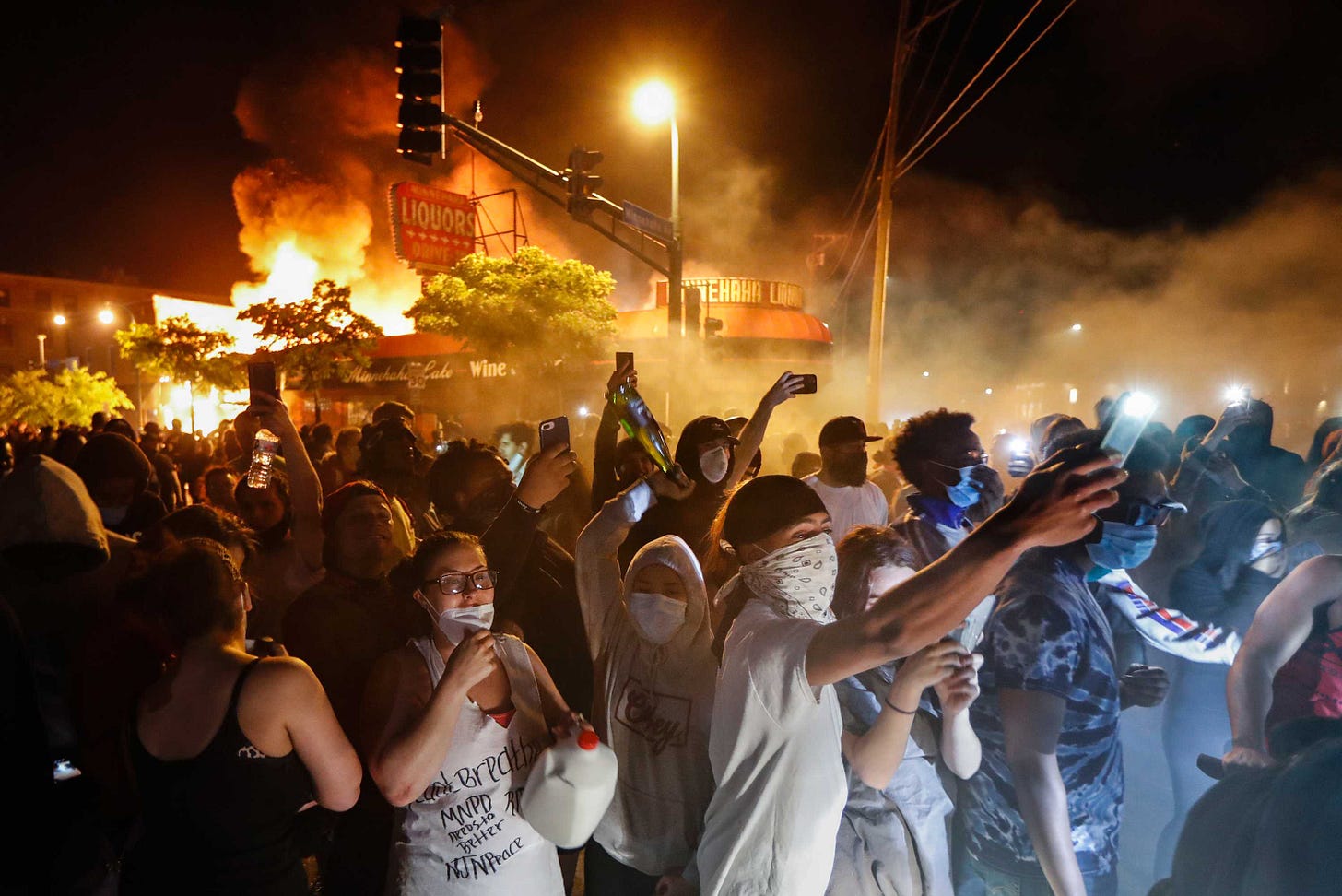

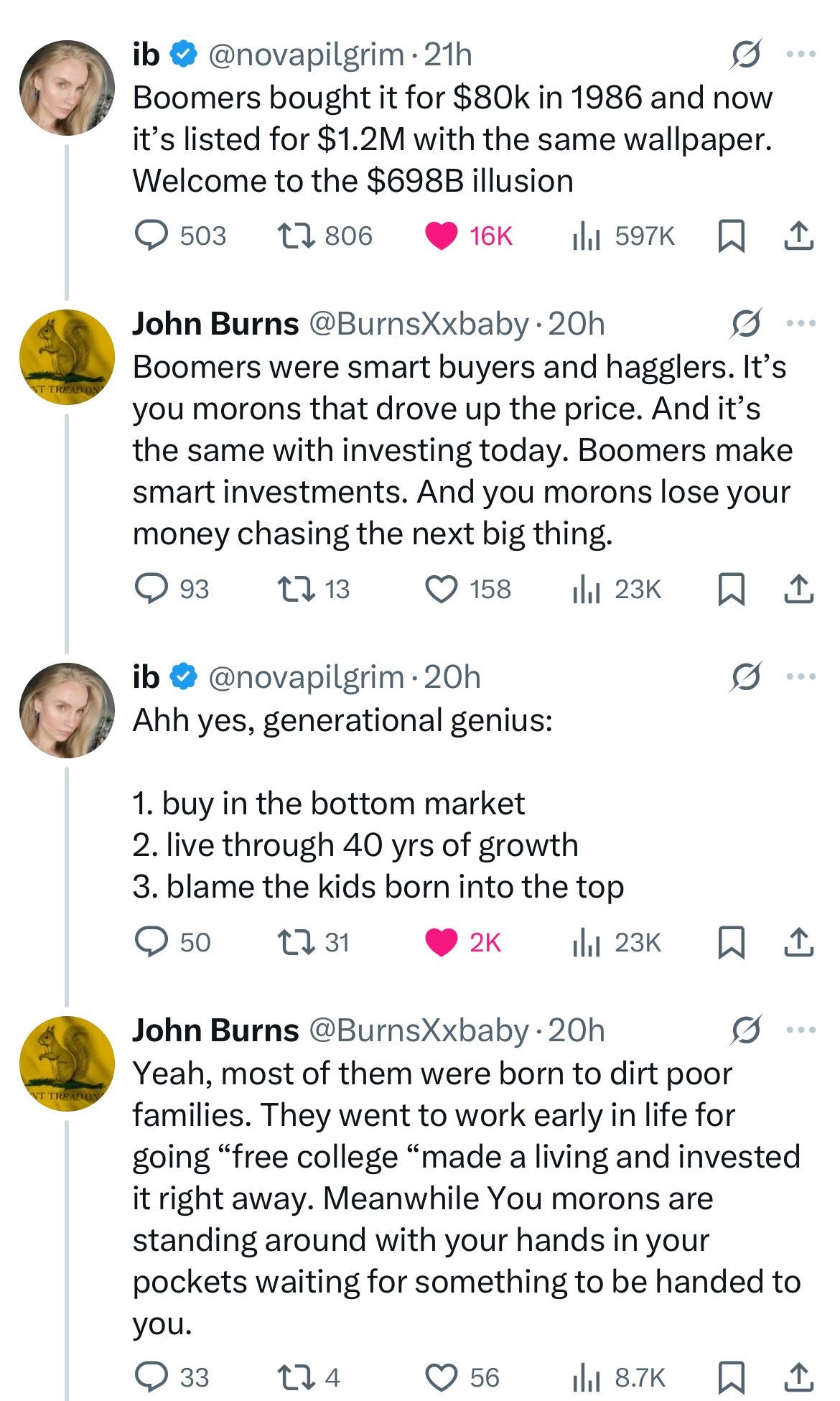


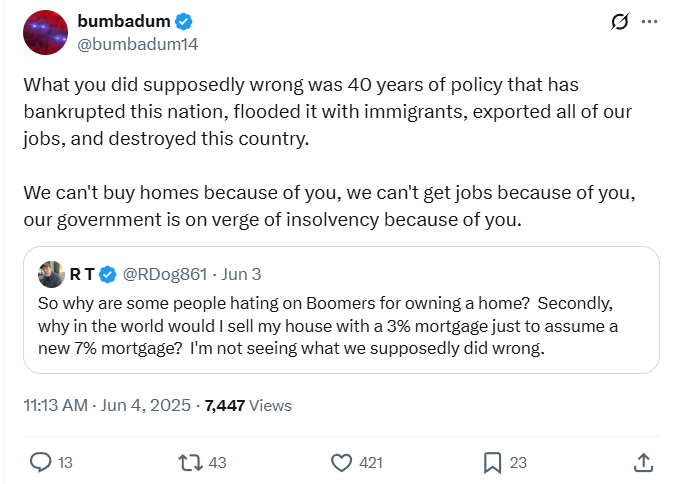


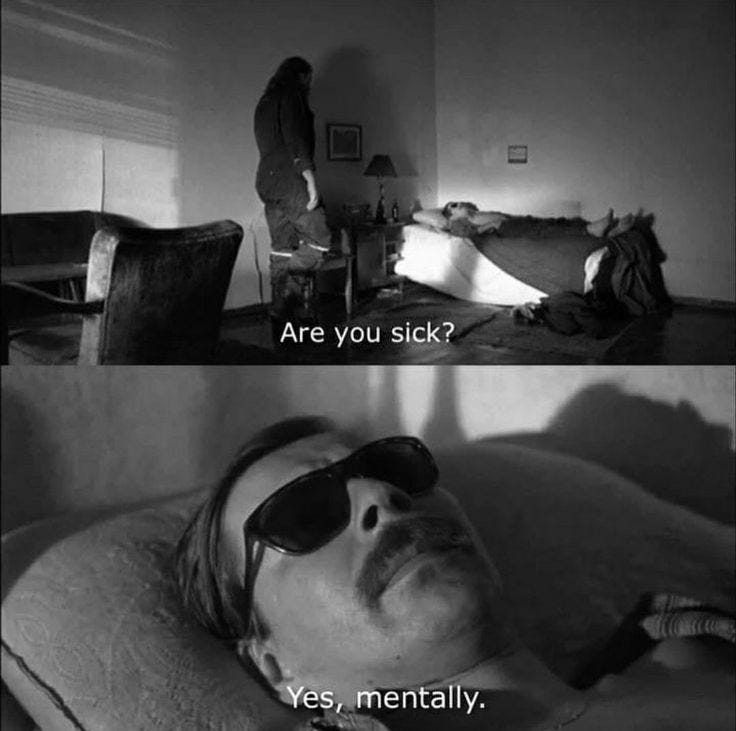


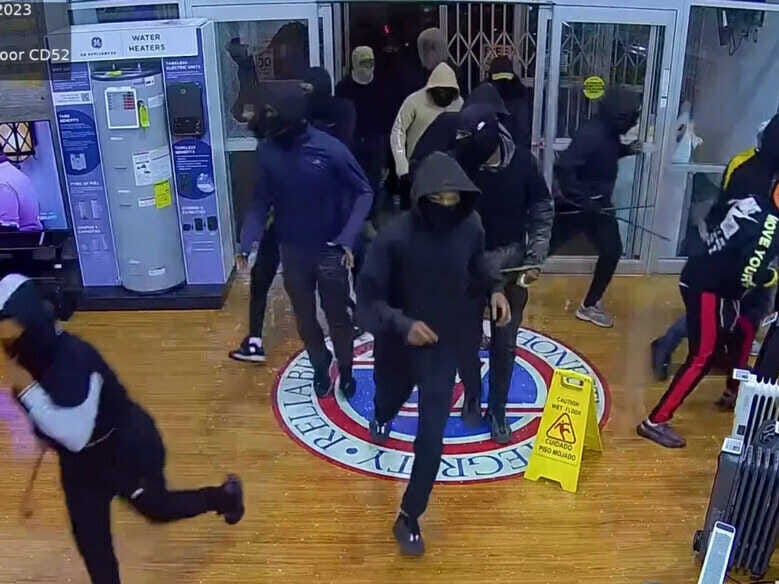



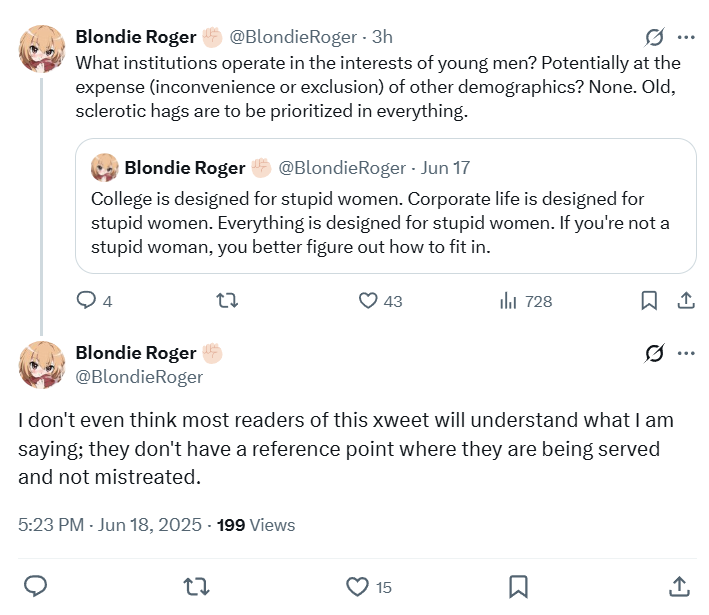

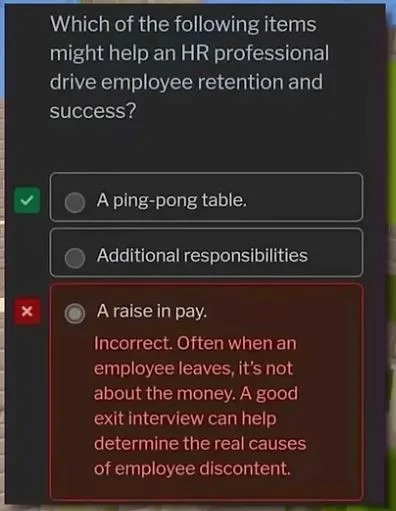


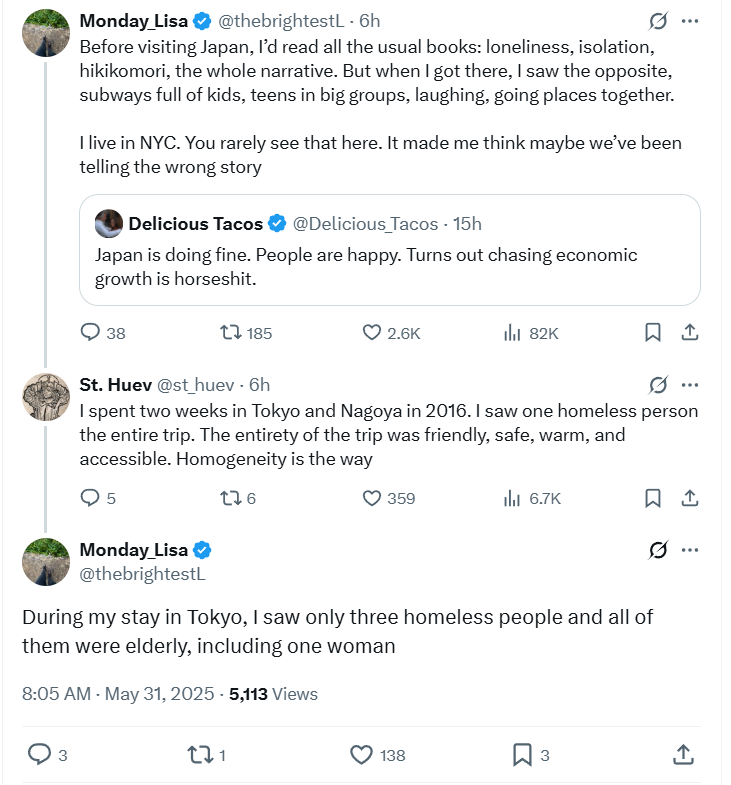


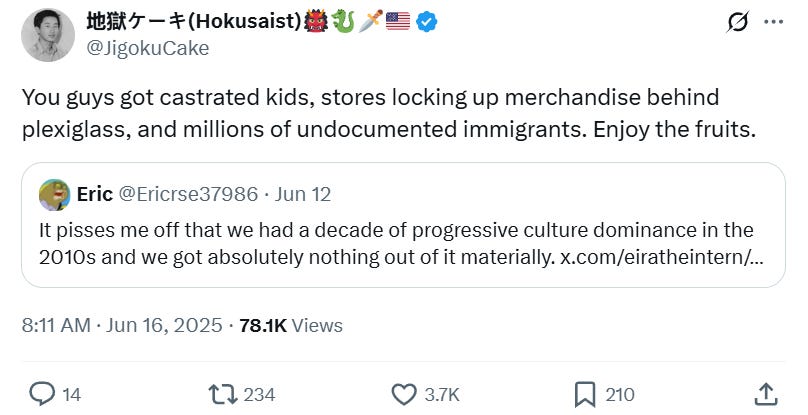
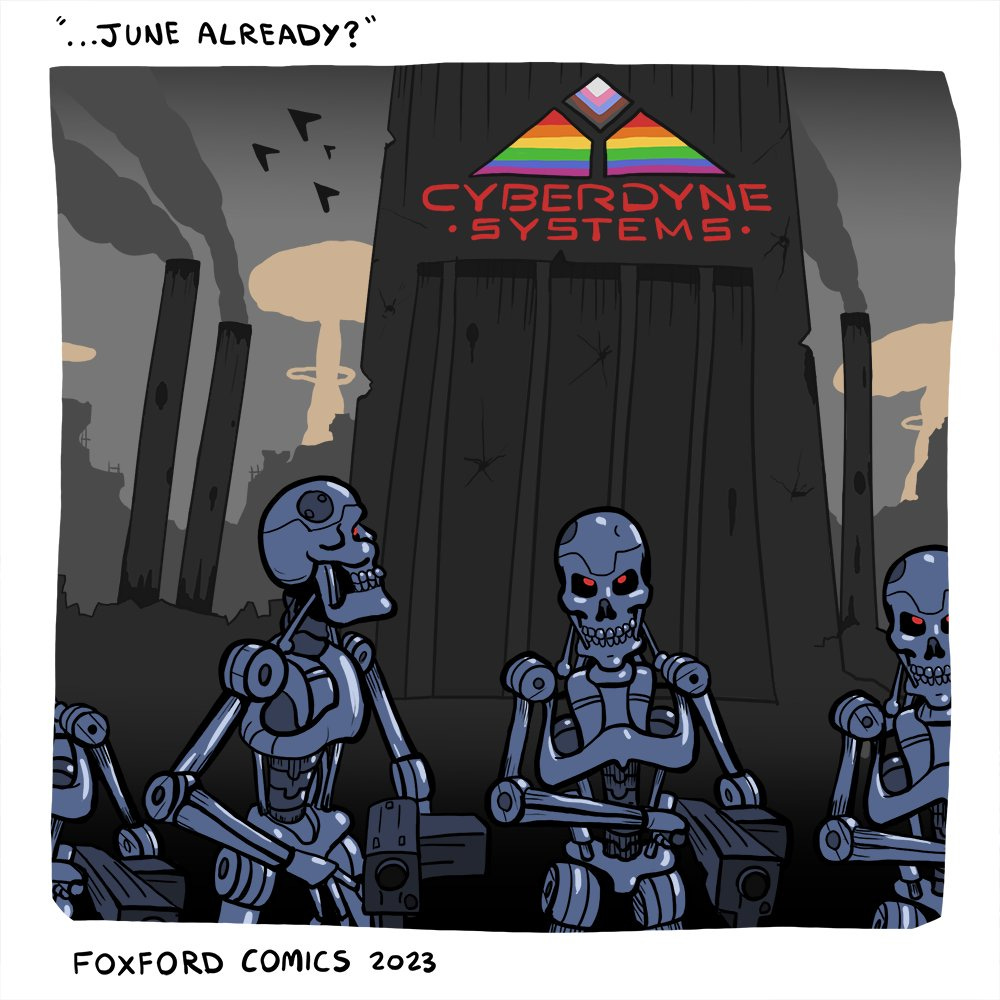

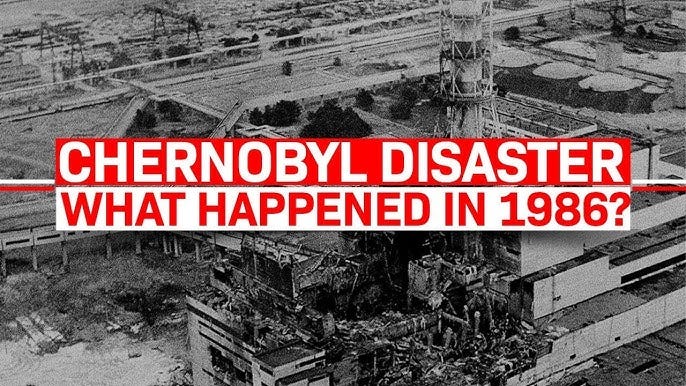




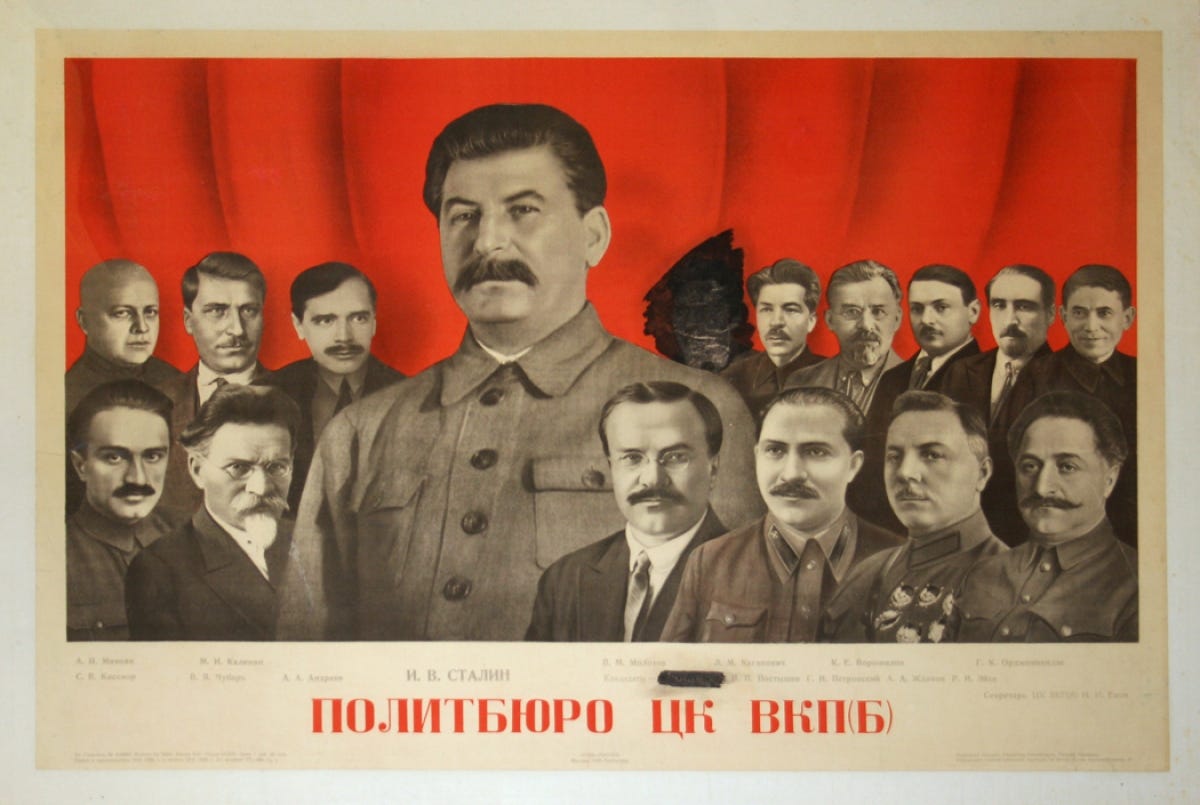
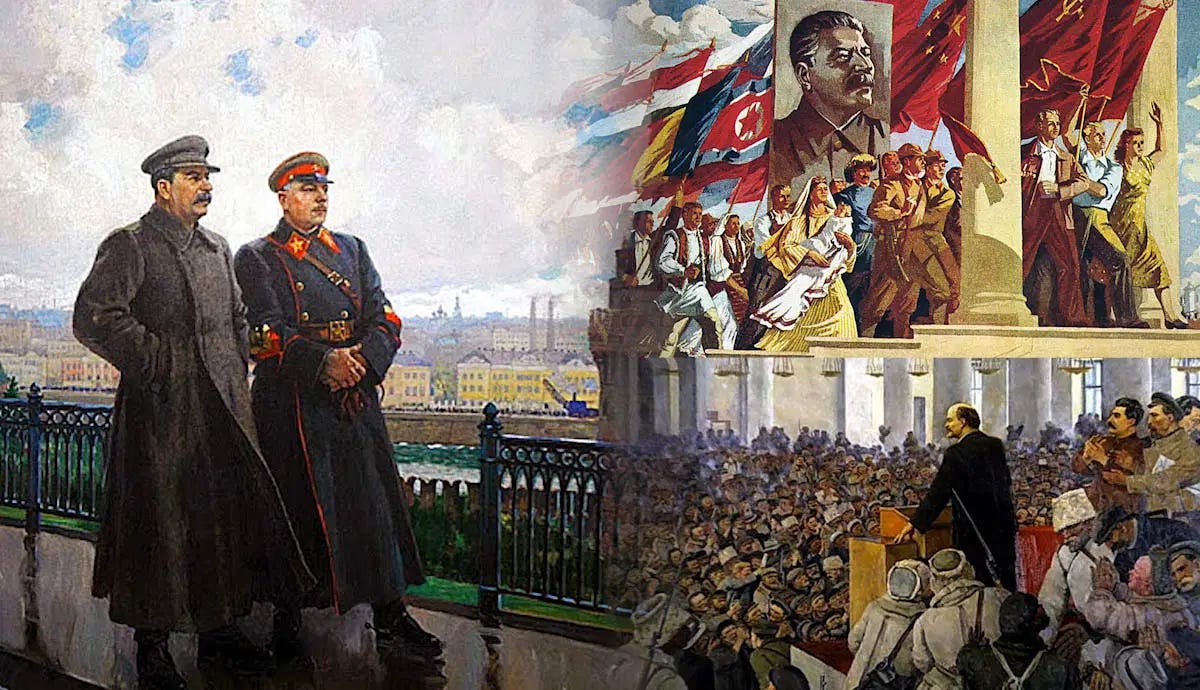








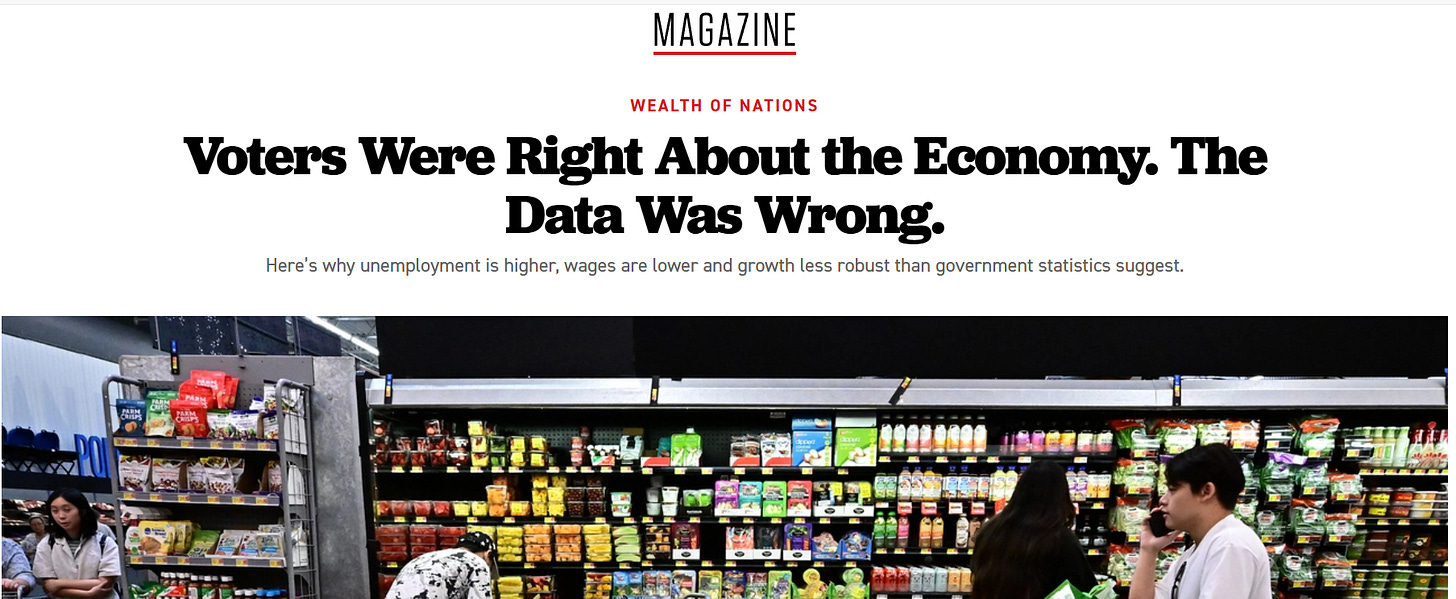
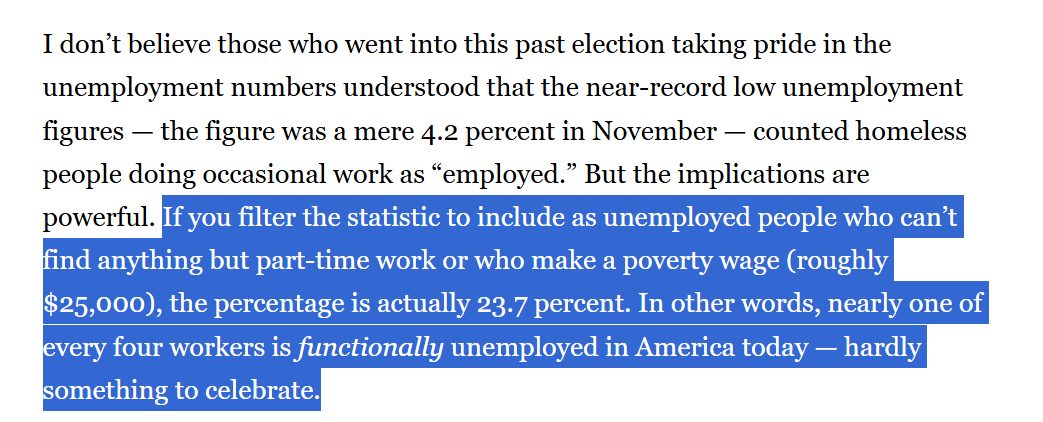







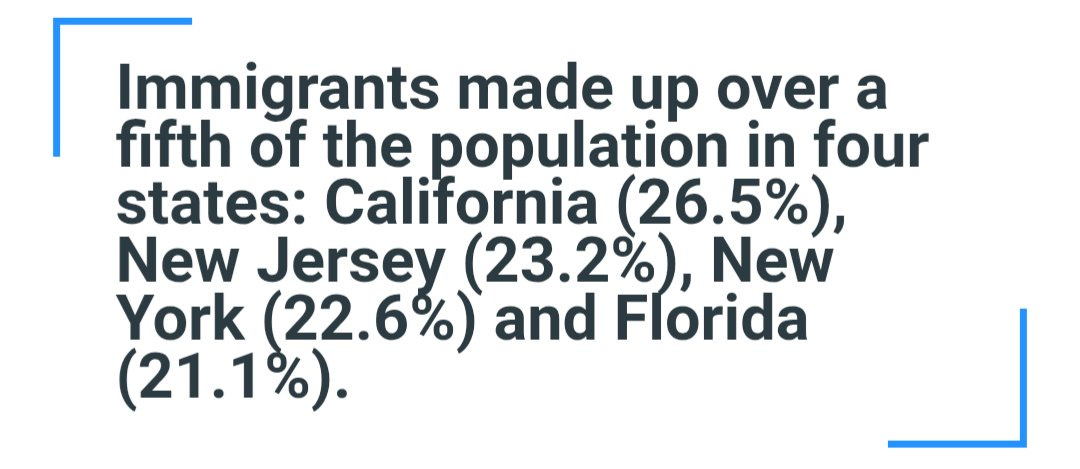



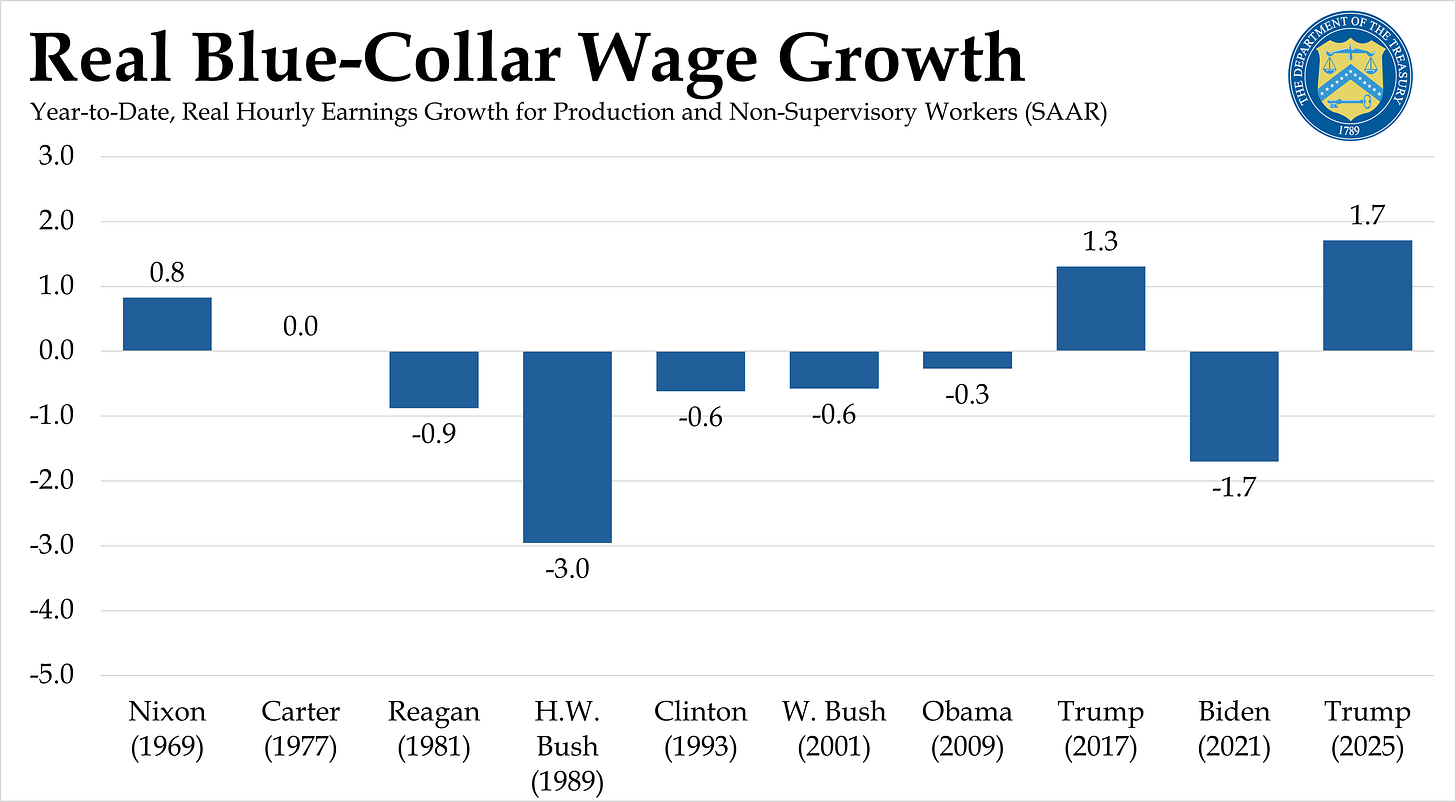












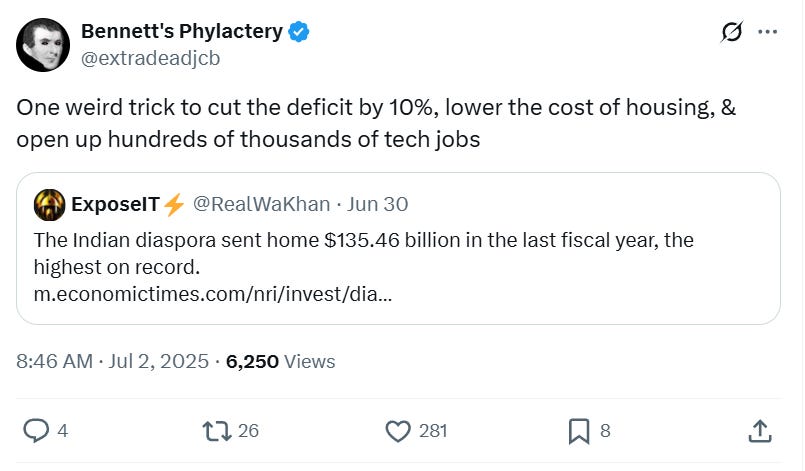



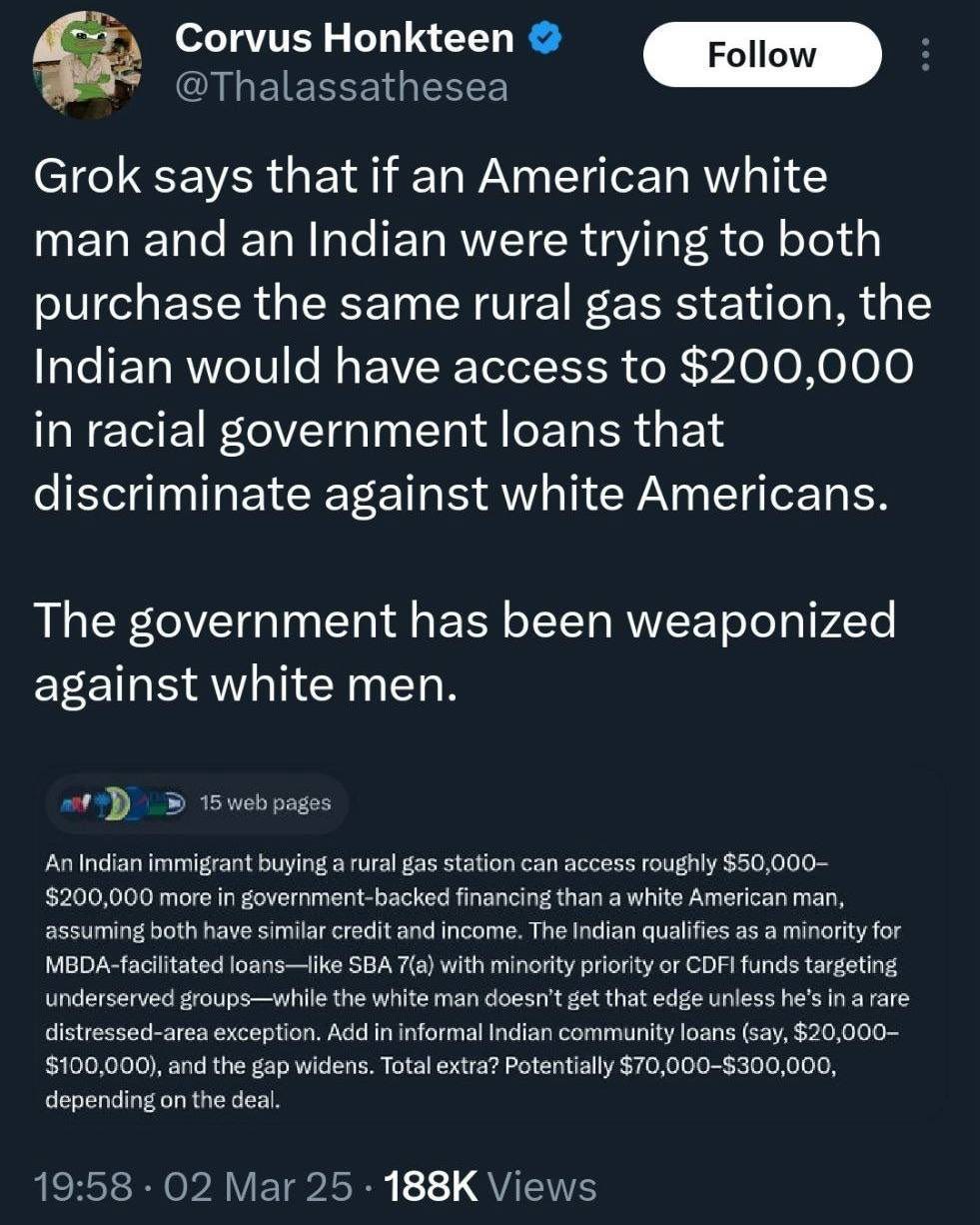
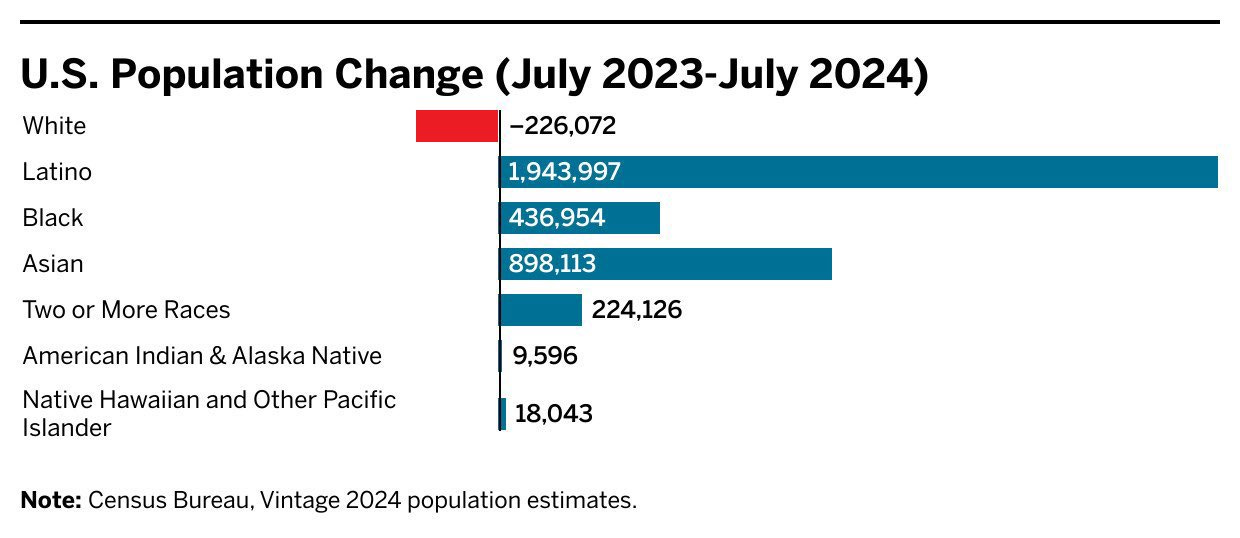


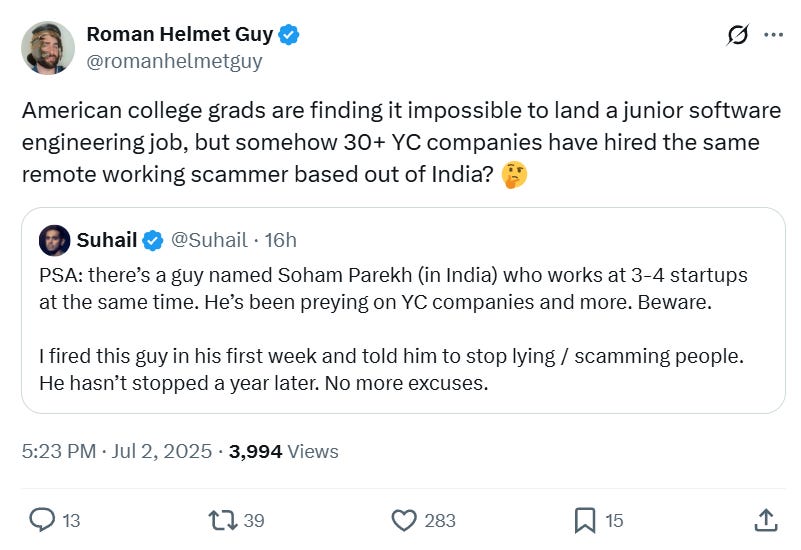


















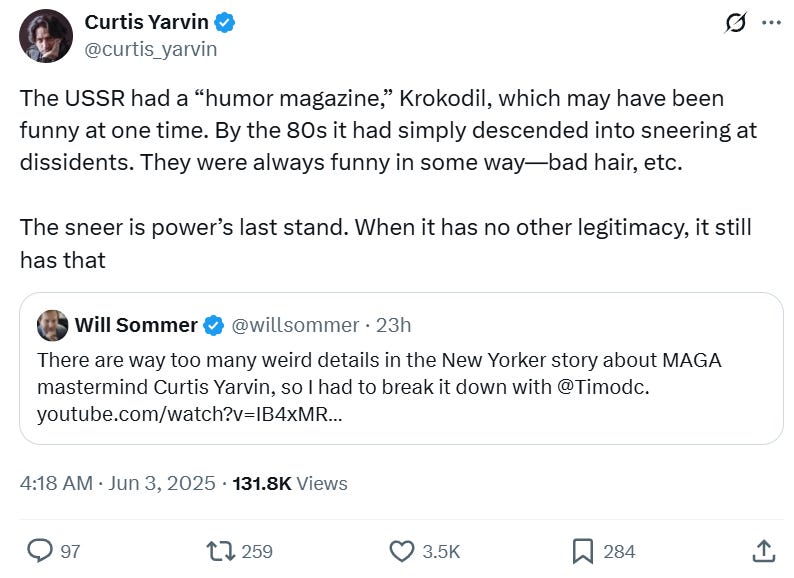


Magisterial, frightening, and darkly comic all at once. I also replaced US, American, America etc. with Canada, Canadian etc. and essentially arrived at the same destination.
Fantastic